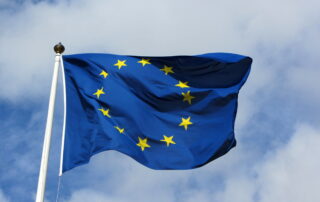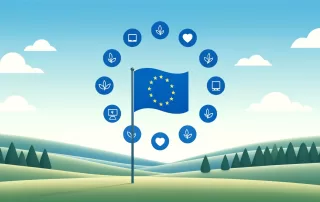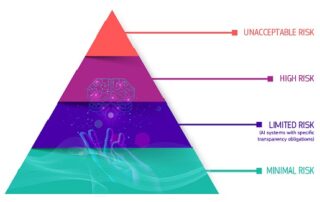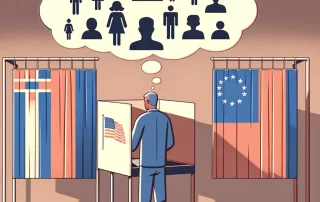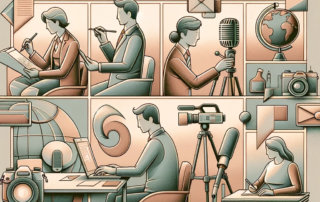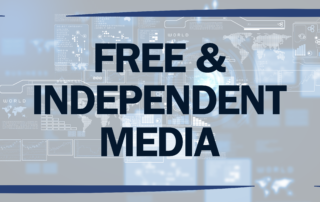Europe is for Peace
The European Parliament’s Spring 2024 Eurobarometer survey is the latest survey conducted before the 2024 European elections. The survey was carried out by Verian (previously known as Kantar Public) between 7 February and 3 March in the 27 EU Member States. More than twenty-six thousand (26411) interviews were conducted face-to-face using CAPI (Computer Assisted Personal Interviewing). The results were weighted according to the population size of each country. Survey Findings According to the survey, there is notable interest among citizens in the upcoming European elections and an understanding of their importance in [...]
How Platforms Compete to Get our Attention?
When you log in to your social media accounts, you are constantly exposed to a flood of new information and content. Every day, you are exposed to this stream of data that is competing for your attention. Being online causes us to switch rapidly between tasks, leading to a lack of presence in the offline world. While online, our attention rapidly switches between tasks on different online activities, apps, social media and websites, and by the end of the day, you may feel drained and irritated. Although technology has brought about many improvements in [...]
The EU Policies on Digital Well-Being
Digital well-being encompasses our online safety, managing our online time, our ability to critically assess the media we consume and becoming responsible and confident digital citizens. In this regard, the European Union is actively striving to enhance the digital environment to benefit all citizens of Europe. According to The Council of the EU and the European Council’s website, “our digital life needs to be safe, easy and respectful of basic freedoms”, and the EU is focusing on various policy areas to enable a digital future for Europe. The Council of Europe also incorporated [...]
EU ARTIFICIAL INTELLIGENCE ACT: NEW RULES
Artificial intelligence is the next industrial revolution. Its proliferation and gradual improvement will profoundly change our economy and daily lives. However, as AI tools become more powerful and efficient, their potential negative impacts raise concerns among institutions and the need to regulate them. The European Union has established itself as a pioneer in governing this new field. On March 13, 2024, the European Parliament approved the Artificial Intelligence Act (AI Act), which lays the foundations for regulating the use of AI in the EU. It is the first legal framework for the development [...]
Mind the Surprising Media Mechanisms Influencing Voting Preferences
Remember the last time you went to vote. Remember how you took the ballot and entered the voting booth with the candidate you long before settled upon firmly fixed in your mind. Or did you decide right there, on the spot? Or perhaps you changed your mind in fractions of a second before the vote stamp touched the ballot? Whether your vote results from careful deliberation and well-pondered expression of your political will or arises from a spontaneous last-moment decision, our minds can sometimes trick us into making decisions we are not fully aware [...]
The EU’s Approach to the Evolving Threat of Disinformation
The current availability of mass information has given us great benefits, including increased global connection and broad access to different viewpoints. With information readily accessible at our fingertips, knowledge is widespread and access to information is democratized. However, tools like the internet have also created new and evolving technological vulnerabilities, a process that can potentially damage democratic structures and human rights. The threat of disinformation has taken the spotlight recently, as technological advances in social media platforms and AI are rapidly developing. In the study “The impact of disinformation on democratic processes [...]
Some Reflections about Journalism and Media Literacy
Tapio Varis, professor emeritus As Tapio Varis will discuss further in Florence at the First European Festival of Journalism and Media Literacy, this paper is going to focus on several questions that need to be answered in order to discuss the topic: What do we think of journalism, and how is it connected with the media? We also need to ask what do we understand with media literacy and its future? The Western journalist schools traditionally analyze the journalistic media in three groups: -Mainstream media have opinions, viewpoints, slant, bias, partiality [...]
Parenting in the Digital Age
The rise of digital media has quickly altered the way parents and children communicate, entertain themselves, gather information, and navigate daily life, especially during exceptional circumstances such as the COVID-19 pandemic. In today’s world, even very young children are regular users of smartphones and tablets, introducing new challenges to parent-child relationships and the parental role. Researches indicate that both young and teenage users encounter challenges in locating, organising, and assessing information, as well as managing their online privacy and ensuring personal safety. Therefore, parents play a crucial role as the primary guides for children's [...]
The Increasing Importance of Digital Well-Being in an Evolving Technological Environment
While digital tools make our lives easier in many aspects by providing conveniences, extensive research consistently highlights the adverse effects of their excessive usage on individuals' physical and psychological well-being. It is argued that digital media users face a growing challenge in managing the overwhelming amount of information and social interactions available to them throughout the day. The need for specific skills has risen to effectively direct digital stimuli towards personal goals, preventing issues like excessive multitasking, fragmented daily schedules, and overconsumption of new media. It is suggested that these adverse effects are [...]
The European Media Freedom Act: A Crucial Step Taken Towards Media Literacy
Independent media play a vital role in creating a public discourse, influencing public opinion, and ensuring accountability of those in positions of authority. It is considered as “a public watchdog” and “a key pillar of democracy. Therefore, the EU places significant emphasis on it and stands as a strong advocate for the existence of free and independent media on an international level. Simultaneously, there are growing concerns within the EU. The Commission has been closely monitoring these developments using tools such as the Rule of Law Report and the Media Pluralism Monitor. The [...]

